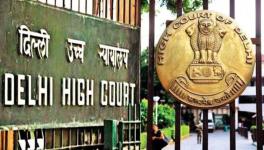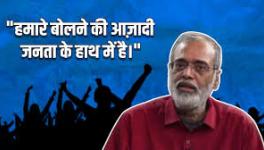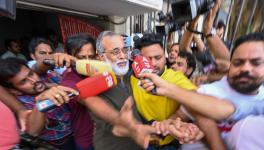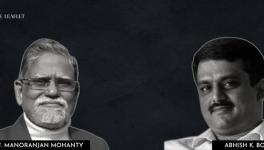Prabir Purkayastha: Fighting the Good Fight From Emergency to Today
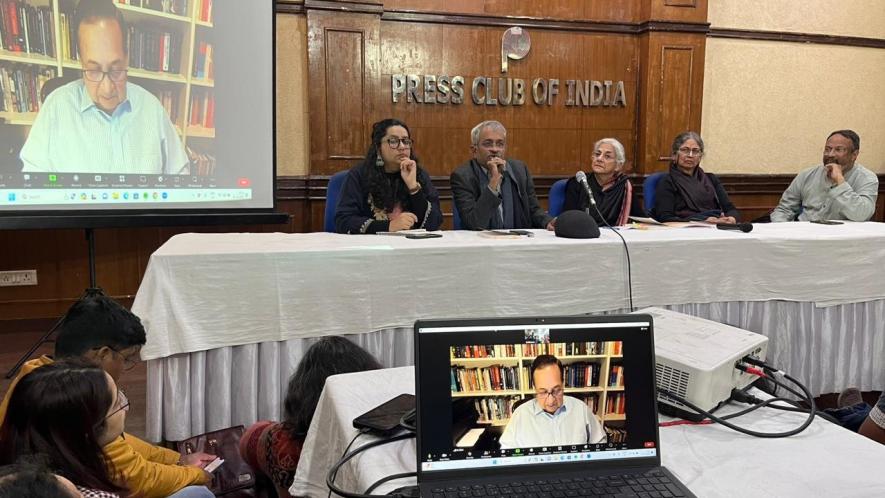
Photo: Press Club of India
On December 14, journalists, writers, activists, and students gathered at the Press Club of India for a panel discussion on the memoir of Prabir Purkayastha, a veteran activist and the founder and editor-in-chief of Newsclick.
Published by Leftword Books, which co-hosted the discussion, “Keeping Up the Good Fight: From the Emergency to the Present Day”, provides a five-decade-long trajectory of not only Purkayastha’s political journey, his work and his activism, but how these were shaped by the broader political and socio-economic changes taking place in India.
As Githa Hariharan, a writer and one of the speakers at the discussion stated, “Even though it is a memoir, and Prabir is the individual person is there, he is always placed in a larger context, in a collective, that can grow into a movement, that can ally with other movements and push for change that will mean better lives for many people.”
In August 1975, three months into the declaration of a period of Emergency across India which saw heavy repression and the curtailment of most basic rights, Purkayastha was abducted from the campus of Jawaharlal Nehru University (JNU) and imprisoned under the Maintenance of Internal Security Act (MISA).
On October 3, Purkayastha, and Newsclick’s administrative head, Amit Chakraborty were arrested in a series of coordinated raids and arrested under the draconian anti-terrorism Unlawful Activities (Prevention) Act (UAPA).
Purkayastha was first arrested as a student, then as a journalist.
His abduction in 1975 came in the midst of a historic protest action against the expulsion of Ashoklata Jain, an elected councilor of the JNU student’s union. Nearly 50 years later, on December 15, 2023, the university’s administration issued notice to 16 students, days after stifling the ability of students to hold protests on campus. On December 12, a high court in Jammu and Kashmir ordered the release of journalist Asif Sultan, five years after he was arrested and subsequently booked under UAPA.
The book and Thursday’s discussion addressed these parallels, between what was considered a period of exception in Indian democracy and today, in order to resist both the erasure of the experience of the Emergency from popular consciousness, as well as any complacency regarding rights and liberties in India today.
“We never got to a situation where we said ‘never again,’” said Sanjay Hegde, a senior advocate in the Supreme Court of India, of the period after the Emergency, “(a situation) where, in (Dr. BR) Ambedkar’s words (who was responsible for drafting the Indian constitution), we resolved to not lay our liberties at the feet of a great man.”
Speaking to the arrests of people including Umar Khalid, Hegde added, “We have a written constitution, we have institutions that are supposed to administer the constitution, but when these institutions fail, it is these men and women of conscience, who fight the good fight, who remind us that the constitution is a solemn compact between citizen and citizen, that this is the nation [in which] we will work together and live together.”
While noting that Purkayastha had been “a victim of the defending the constitution twice in his lifetime”, Hegde invoked the journalist’s own words in refusing such a characterization: “Victimhood robs us of participation in the creation of history, it reduces us to mere objects of history, instead I would like to assume the vantage point of people as the makers of history,” Purkayastha writes in the book.
“Yes, the government of the day wields powers that seem to overwhelm individuals and organizations, but it is people and their actions that finally determine history, not as we please and when we please, but in ways that neither the people nor their rulers anticipate.”
The panel discussion also featured researcher Indrani Mazumdar, Bezwada Wilson, an activist and founding member of the Safai Karamchari Andolan (SKA), and N. Ram, a journalist and director of the Hindu Publishing Group.
Terming the current period in India as being under a “Hindutva authoritarian regime”, Ram warned that “institutions are being captured…manipulated and media freedom is under full scale attack”.
Speaking specifically to the raids on Newsclick, he said, “(t)he whole McCarthyite campaign, it is not essentially a media story. It is about a completely new socio-political, ideological formation which has injected a lot of poison into the information ecosystem.”
Wilson similarly warned against attempts to create an “opposition-mukt bharat” (opposition-free India), while urging the need for people to come together against an authoritarian state. “The citizens are important, the sovereign citizens make the state”.
As such, the speakers emphasized the need to reject pessimism.
Quoting Purkayastha, Hariharan stated, “The story of our recent past and one that continues to unfold is not just about repression. The story is incomplete without the resistance we have witnessed, written about, and been part of.”
Get the latest reports & analysis with people's perspective on Protests, movements & deep analytical videos, discussions of the current affairs in your Telegram app. Subscribe to NewsClick's Telegram channel & get Real-Time updates on stories, as they get published on our website.











